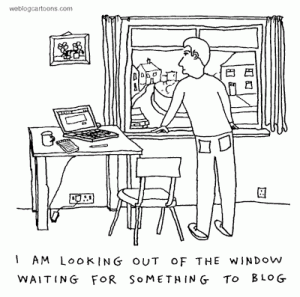
I have to figure out this blogging thing. About 2 weeks ago I was invited to host a blog on the Psychology Today website. So I set up a sort of parallel blog there, with most of the same posts. I’ve been making them a bit shorter and punchier for PT, and I’ve been providing more detail, including neuro detail, for my home blog (this one).
But I’m slightly mixed up on where to go from here. Should I retain two blogs? My PT blog gets up to 500 visits per day. It’s PT, after all. This one gets anywhere from 10 to 50 most days. And why bother with two, after all? Especially if they cover more or less the same content? But I like having my OWN blog/site, and all those flashing ads on the PT site annoy me. I have old-fashioned eyeballs.
Maybe the thing to do is to get more flowy — more personal, more newsy — and move away from essay-like postings. So says Isabel, my wife, who did a very successful blog during our last couple of years in Toronto. I like blog writing. It’s great to knock off a piece of…something…in an hour or so, rather than spend six months on a scientific paper that very few people will ever read. But the flow of my life is pretty calm at the moment, and I’m not going to try to interest people in what I’m having for lunch or my thoughts while stuck in traffic.
People who read this blog are, I think, I hope, either those with present addictions, past addictions, or people interested in the science and/or treatment of addiction. So what’s to flow about…that might be of interest to you? My addiction is mostly past, not present, though I have struggled with it in recent times. A “memoir” article in Toronto Life (November 2011 issue) recounts my difficulty getting off oxycodone last spring, after a stint of severe sciatica and recovery from spinal surgery. And I sometimes drink more than I should. So, yeah, I’m not completely in the clear. As far as I know, no addict ever is. But I’m in good shape these days.
I recently found a blog by someone who is currently — like this month! — getting off alcohol. She’s on week 2 or 3 of recovery by now, and I really admire her blow-by-blow description of what it’s like to quit: how it feels, the voices in her head, the spikes of craving, and the relief at moving on. That’s one kind of flow that can be of real interest to people in the addiction world. But my struggles just aren’t that dramatic these days.
And then there’s all this late-breaking news on the science, psychology, and politics of addiction. A special issue of Nature Reviews Neuroscience was recently dedicated to addiction. And the Addiction Newsfeed from Science Daily pulls all kinds of interesting stuff from just about everywhere — Click on Home and scroll down to see it. I can be more current and more, I guess, opinionated if I follow this stuff more closely. Maybe I’ll try that for a while.
I’m just thinking out loud at the moment. But I’d love to hear your thoughts as well.
Leave a Reply